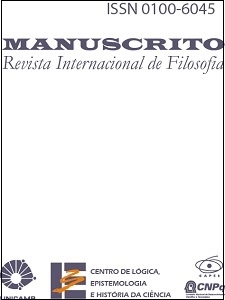Abstract
Traditionally the modern theory of ideas has been discussed primarily in reference to its alleged introduction of a veil of mental items between the mind and the world, which leads, through the empiricists, to radical skepticism about the existence of an external world. Here I propose to emphasize an entirely different aspect of the Cartesian theory of ideas which, in my view, is more fundamental in opening the empiricist path that leads to Hume’s radical skepticism. I argue that what I call the “phenomenological presentation” model of ultimate justification is rooted in a fundamental ambiguity between sensible and intellectual apprehension insinuated by Descartes’s view of “clear and distinct” ideas together with his emphasis on the priority of intuition over logical inference. Sensible apprehension relies on immediate acquaintance with items phenomenologically and ostensively present before the mind as given particulars. The phenomenological presentation model takes its clues from sensible apprehension, although the items present before the mind might themselves be either ideas of the understanding, images of the imagination, sensory impressions, or material external objects. Intellectual apprehension, by contrast, as I illustrate with Leibniz’s model of our knowledge of concepts and truths of reason, consists in the discursive, non-ostensive grasping of the generality of abstract concepts and of formal structures (as opposed to particular contents). For Leibniz, all intellectual apprehension is unambiguously “logical discursive apprehension” as opposed to “direct ostensive apprehension.” Thus, Leibniz unmistakably disambiguates Descartes’s model in favor of a precise intellectual model. The empiricists, by contrast, correspondingly disambiguate Descartes’s conception in favor of an entirely sensible model.
References
Carriero, J. Descartes and the Autonomy of the Human Understanding. New York/London: Garland Publishing, 1990.
Dascal, M. Leibniz: Language, Signs and Thought. Amsterdam/Philadelphia: John Benjamins Publishing Company, 1987.
De Pierris, G. Hume’s Pyrrhonian Skepticism and the Belief in Causal Laws. Journal of the History of Philosophy, vol. XXXIX, n. 3, 2001.
De Pierris, G. Causation as a Philosophical Relation in Hume. Philosophy and Phenomenological Research, vol. LXIV, n. 3, 2002.
Descartes, R. The Philosophical Writings of Descartes. Edited by J. Cottingham, R. Stoothoff and D. Murdoch. Cambridge: Cambridge University Press, 1985 (2v). Vol. 3, 1991.
Leibniz, G. W. New Essays on Human Understanding. Edited and transl. by P. Remnant and J. Bennett. Cambridge: Cambridge University Press, 1981.
Leibniz, G. W. Philosophical Papers and Letters. Edited by Leroy E. Loemker. Dordrecht: D. Reidel Publishing Company, 1969. (Second edition)
Wilson, M. Descartes. London: Routledge & Kegan Paul, 1978.

This work is licensed under a Creative Commons Attribution 4.0 International License.
Copyright (c) 2007 Manuscrito: Revista Internacional de Filosofia

